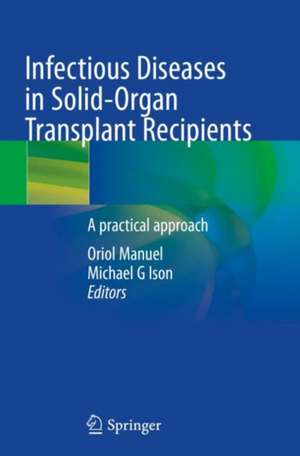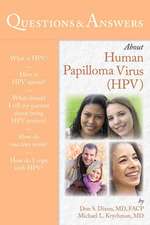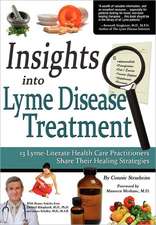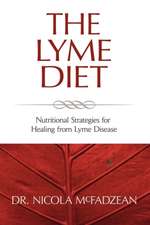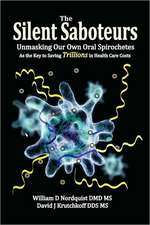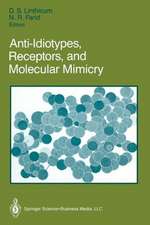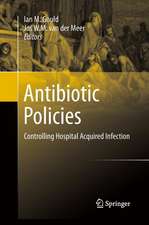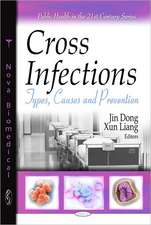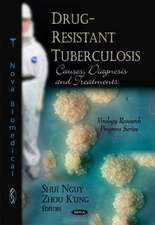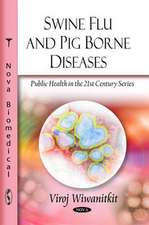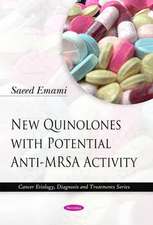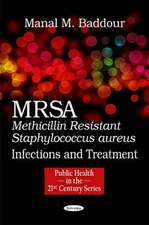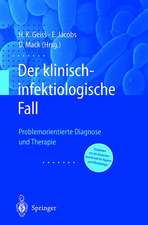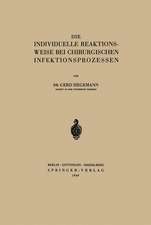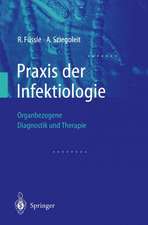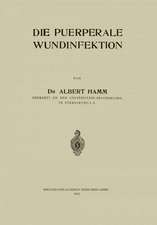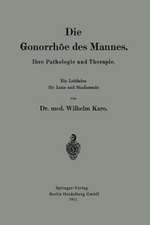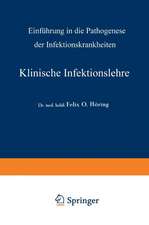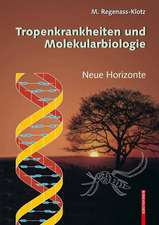Infectious Diseases in Solid-Organ Transplant Recipients: A practical approach
Editat de Oriol Manuel, Michael G Isonen Limba Engleză Paperback – 15 aug 2020
Infections in SOT recipients – often due to multidrug-resistant organisms – represent a major challenge. Preventive strategies need to be adapted according to the type of allograft and period after transplantation. Moreover, toxicity and drug interaction with immunosuppressive drugs must be taken into consideration when treating infectious complications. In explaining in depth how best to ensure allograft and patient survival, this book will be of value to infectious disease specialists and transplant physicians at all levels of experience.
| Toate formatele și edițiile | Preț | Express |
|---|---|---|
| Paperback (1) | 568.43 lei 38-44 zile | |
| Springer International Publishing – 15 aug 2020 | 568.43 lei 38-44 zile | |
| Hardback (1) | 735.92 lei 38-44 zile | |
| Springer International Publishing – 18 iun 2019 | 735.92 lei 38-44 zile |
Preț: 568.43 lei
Preț vechi: 598.34 lei
-5% Nou
Puncte Express: 853
Preț estimativ în valută:
108.78€ • 112.92$ • 90.71£
108.78€ • 112.92$ • 90.71£
Carte tipărită la comandă
Livrare economică 18-24 martie
Preluare comenzi: 021 569.72.76
Specificații
ISBN-13: 9783030153960
ISBN-10: 3030153967
Pagini: 304
Ilustrații: VI, 304 p. 21 illus., 17 illus. in color.
Dimensiuni: 155 x 235 mm
Greutate: 0.57 kg
Ediția:1st ed. 2019
Editura: Springer International Publishing
Colecția Springer
Locul publicării:Cham, Switzerland
ISBN-10: 3030153967
Pagini: 304
Ilustrații: VI, 304 p. 21 illus., 17 illus. in color.
Dimensiuni: 155 x 235 mm
Greutate: 0.57 kg
Ediția:1st ed. 2019
Editura: Springer International Publishing
Colecția Springer
Locul publicării:Cham, Switzerland
Cuprins
Section A: general transplant infectious diseases.- 1. Current epidemiology of infection in SOT recipients: a general schedule.- 2. How I assess the risk of infection in SOT recipients.- 3. Pre- and peri- transplant period: screening and treatment of infections in the pre transplant period, donor derived infection.- 4. Early post transplant period. Peri and post transplant preventive strategies. Antiviral, anti-fungal and anti-bacterial prevention.- 5. Late post transplant period. Post transplant vaccination, travel advice, food-borne infections.- Section B: specific pathogens.- 1. How I prevent and treat CMV infection (and other herpesviruses).- 2. How I prevent and treat EBV related complications.- 3. How I prevent and treat polyomavirus infection.- 4. How I prevent and treat respiratory virus infection.- 5. How I prevent and treat viral hepatitis.- 6. How I prevent and treat multi-drug resistant bacterial infection.- 7. How I prevent and treat mold infections.- 8. How I prevent and treat yeast infections.- 9. How I prevent and treat mycobacterial infections.- 10. How I prevent and treat other opportunistic infections: nocardia, toxoplasmosis, pneumocystis, Chagas.- Section C: management of specific syndromes.- 1. Management of pneumonia.- 2. Management of CNS infections.- 3. Management of UTI.- 4. Management of infections of devices: catheter-related infections, pre transplant VAD infections, infections of ECMO devices.- 5. Management of skin infections.
Recenzii
“Trainees in infectious disease and physicians with sporadic encounters with transplant patients will benefit most from this book. … This book does what its title says ‐ provides a practical overview of infectious disease in solid organ transplant recipients. It is one of several new books in the field of immunocompromised infectious diseases, and this one is geared toward learners.” (Erica Stohs, Doody's Book Reviews, November 22, 2019)
Notă biografică
Dr. Oriol Manuel works at the Lausanne University Hospital, Switzerland, as transplant infectious diseases specialist and clinical research scientist. His main interest has been in the area of clinical research involving viral infections in transplant recipients. He is interested in the epidemiology and preventive strategies for cytomegalovirus (CMV) disease in the transplant population, in particular on the use of immune monitoring for CMV. He has also published on influenza vaccination strategies after transplantation. He is “Privat-Docent” and “Maître d’enseignement et de recherche” of the University of Lausanne. He is the chairman of the European Study Group for Infections in Compromised Hosts (ESGICH) and member of the Scientific Committee of the Swiss Transplant Cohort Study (STCS).
Dr. Michael Ison is Medical Director of the Transplant & Immunocompromised Host Infectious Diseases Service, Northwestern University Comprehensive Transplant Center, Chicago, and Professor ofMedicine and Surgery. He obtained his medical degree at the University of South Florida College of Medicine and then completed an Internal Medicine Residency and a General Internal Medicine Fellowship at Oregon Health Sciences University. He subsequently obtained his Master of Science in Health Evaluation Sciences and completed an Infectious Diseases Fellowship at the University of Virginia. After additional training in Transplant Infectious Diseases at the Massachusetts General Hospital and Harvard Medical School under the mentorship of
Dr. Jay A. Fishman, he joined the faculty of the Divisions of Infectious Diseases and Organ Transplantation at Northwestern University Feinberg School of Medicine in 2005.
Dr. Michael Ison is Medical Director of the Transplant & Immunocompromised Host Infectious Diseases Service, Northwestern University Comprehensive Transplant Center, Chicago, and Professor ofMedicine and Surgery. He obtained his medical degree at the University of South Florida College of Medicine and then completed an Internal Medicine Residency and a General Internal Medicine Fellowship at Oregon Health Sciences University. He subsequently obtained his Master of Science in Health Evaluation Sciences and completed an Infectious Diseases Fellowship at the University of Virginia. After additional training in Transplant Infectious Diseases at the Massachusetts General Hospital and Harvard Medical School under the mentorship of
Dr. Jay A. Fishman, he joined the faculty of the Divisions of Infectious Diseases and Organ Transplantation at Northwestern University Feinberg School of Medicine in 2005.
Textul de pe ultima copertă
This book describes a practical approach to the diagnosis, management, and prevention of infectious complications in solid-organ transplant (SOT) candidates and recipients, based on both up-to-date clinical evidence and state of the art expert opinion from world-renowned experts in the field. The book is divided into three parts, the first of which explains risk assessment and the general approach to infectious diseases in the pre-, peri-, and early and late post-transplant periods. The remaining two sections address the prevention and treatment of infection with particular pathogens and the management of specific syndromes, such as pneumonia, CNS infections, UTIs, and skin infections.
Infections in SOT recipients – often due to multidrug-resistant organisms – represent a major challenge. Preventive strategies need to be adapted according to the type of allograft and period after transplantation. Moreover, toxicity and drug interaction with immunosuppressive drugs must be taken into consideration when treating infectious complications. In explaining in depth how best to ensure allograft and patient survival, this book will be of value to infectious disease specialists and transplant physicians at all levels of experience.
Infections in SOT recipients – often due to multidrug-resistant organisms – represent a major challenge. Preventive strategies need to be adapted according to the type of allograft and period after transplantation. Moreover, toxicity and drug interaction with immunosuppressive drugs must be taken into consideration when treating infectious complications. In explaining in depth how best to ensure allograft and patient survival, this book will be of value to infectious disease specialists and transplant physicians at all levels of experience.
Caracteristici
Describes the management of difficult-to-treat infections in solid-organ transplant (SOT) recipients Explains the prevention and treatment of infections due to specific pathogens Presents expert opinion from world-renowned specialists
